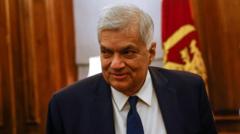In a surprising twist to Bolivia's political landscape, Rodrigo Paz Pereira is poised to lead the country as the first non-left wing president in nearly 20 years. Preliminary results from the recent elections reveal a shift in sentiment among voters, indicating a desire for change amid economic turmoil. Two candidates, Paz Pereira and former president Jorge Quiroga, will advance to a runoff, possibly altering Bolivia's foreign relations and economic policies.
Bolivia Gears Up for Political Shift as First Non-Left Wing President in 20 Years Emerges

Bolivia Gears Up for Political Shift as First Non-Left Wing President in 20 Years Emerges
The Bolivian presidential elections signal a pivotal change with Rodrigo Paz Pereira's unexpected lead, challenging nearly two decades of socialist rule.
Bolivia is on the brink of ushering in a new political era as voters gear up to elect their first non-left wing president in nearly two decades, based on preliminary results from Sunday’s presidential elections. Senator Rodrigo Paz Pereira from the Christian Democratic Party has emerged as the frontrunner, swiftly challenging the historic dominance of the incumbent socialist party, Movimiento al Socialismo (MAS).
Paz Pereira garnered significant attention with his campaign promises centered on redistributing funds towards regional entities and combating corruption, encapsulated in his motto "capitalism for all, not just a few". In contrast, former president Jorge Quiroga secured second place, leading to a likely runoff election scheduled for October as neither candidate gained the requisite majority.
In a surprising twist to the polls, many had anticipated that businessman Samuel Doria Medina would lead the race. The electoral authorities state that final results may take up to three days, but early indications show a clear shift in voter sentiment with many clamoring for change due to the country's ongoing economic crisis, characterized by shortages and inflation.
The election results suggest a potential repositioning of Bolivia’s foreign policy, likely favoring alliances with the U.S. as opposed to the strong ties formed with China, Russia, and Iran in previous years. Both Paz Pereira and Quiroga's pro-capitalist platforms point toward increased support for foreign investments in Bolivia's rich lithium reserves, crucial for global tech industries.
Moreover, the MAS party and its candidates faced severe backlash, reflecting deepening divisions within the leftist faction and widespread unpopularity. Incidents of hostility were reported at polling stations, where Eduardo del Castillo, the MAS candidate, was met with public scorn, and violent outbursts were noted against other candidates, indicating a stark rejection of the status quo.
This tumultuous political backdrop was further complicated by the absence of ex-president Evo Morales from the ballot, who previously dominated the nation’s political scene between 2006 and 2019. Following his inability to run, Morales has been vocal against the electoral process, urging his supporters to nullify their votes as electoral tensions simmer.
With Morales barred from seeking re-election amid controversies surrounding his past governance and allegations against him, the current political climate hints at a transformative juncture for Bolivia. As the results evolve, the emerging leadership's approach to economic recovery and international relations will be closely scrutinized by both Bolivians and the global community.
Paz Pereira garnered significant attention with his campaign promises centered on redistributing funds towards regional entities and combating corruption, encapsulated in his motto "capitalism for all, not just a few". In contrast, former president Jorge Quiroga secured second place, leading to a likely runoff election scheduled for October as neither candidate gained the requisite majority.
In a surprising twist to the polls, many had anticipated that businessman Samuel Doria Medina would lead the race. The electoral authorities state that final results may take up to three days, but early indications show a clear shift in voter sentiment with many clamoring for change due to the country's ongoing economic crisis, characterized by shortages and inflation.
The election results suggest a potential repositioning of Bolivia’s foreign policy, likely favoring alliances with the U.S. as opposed to the strong ties formed with China, Russia, and Iran in previous years. Both Paz Pereira and Quiroga's pro-capitalist platforms point toward increased support for foreign investments in Bolivia's rich lithium reserves, crucial for global tech industries.
Moreover, the MAS party and its candidates faced severe backlash, reflecting deepening divisions within the leftist faction and widespread unpopularity. Incidents of hostility were reported at polling stations, where Eduardo del Castillo, the MAS candidate, was met with public scorn, and violent outbursts were noted against other candidates, indicating a stark rejection of the status quo.
This tumultuous political backdrop was further complicated by the absence of ex-president Evo Morales from the ballot, who previously dominated the nation’s political scene between 2006 and 2019. Following his inability to run, Morales has been vocal against the electoral process, urging his supporters to nullify their votes as electoral tensions simmer.
With Morales barred from seeking re-election amid controversies surrounding his past governance and allegations against him, the current political climate hints at a transformative juncture for Bolivia. As the results evolve, the emerging leadership's approach to economic recovery and international relations will be closely scrutinized by both Bolivians and the global community.

















